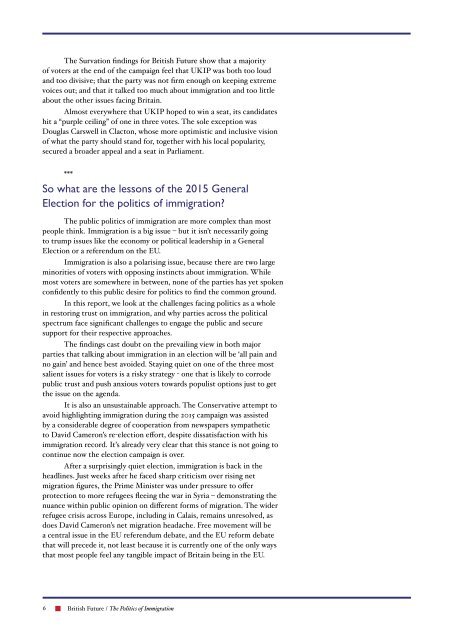THE POLITICS OF IMMIGRATION
The-politics-of-immigration
The-politics-of-immigration
Create successful ePaper yourself
Turn your PDF publications into a flip-book with our unique Google optimized e-Paper software.
The Survation findings for British Future show that a majority<br />
of voters at the end of the campaign feel that UKIP was both too loud<br />
and too divisive; that the party was not firm enough on keeping extreme<br />
voices out; and that it talked too much about immigration and too little<br />
about the other issues facing Britain.<br />
Almost everywhere that UKIP hoped to win a seat, its candidates<br />
hit a “purple ceiling” of one in three votes. The sole exception was<br />
Douglas Carswell in Clacton, whose more optimistic and inclusive vision<br />
of what the party should stand for, together with his local popularity,<br />
secured a broader appeal and a seat in Parliament.<br />
***<br />
So what are the lessons of the 2015 General<br />
Election for the politics of immigration?<br />
The public politics of immigration are more complex than most<br />
people think. Immigration is a big issue – but it isn’t necessarily going<br />
to trump issues like the economy or political leadership in a General<br />
Election or a referendum on the EU.<br />
Immigration is also a polarising issue, because there are two large<br />
minorities of voters with opposing instincts about immigration. While<br />
most voters are somewhere in between, none of the parties has yet spoken<br />
confidently to this public desire for politics to find the common ground.<br />
In this report, we look at the challenges facing politics as a whole<br />
in restoring trust on immigration, and why parties across the political<br />
spectrum face significant challenges to engage the public and secure<br />
support for their respective approaches.<br />
The findings cast doubt on the prevailing view in both major<br />
parties that talking about immigration in an election will be ‘all pain and<br />
no gain’ and hence best avoided. Staying quiet on one of the three most<br />
salient issues for voters is a risky strategy - one that is likely to corrode<br />
public trust and push anxious voters towards populist options just to get<br />
the issue on the agenda.<br />
It is also an unsustainable approach. The Conservative attempt to<br />
avoid highlighting immigration during the 2015 campaign was assisted<br />
by a considerable degree of cooperation from newspapers sympathetic<br />
to David Cameron’s re-election effort, despite dissatisfaction with his<br />
immigration record. It’s already very clear that this stance is not going to<br />
continue now the election campaign is over.<br />
After a surprisingly quiet election, immigration is back in the<br />
headlines. Just weeks after he faced sharp criticism over rising net<br />
migration figures, the Prime Minister was under pressure to offer<br />
protection to more refugees fleeing the war in Syria – demonstrating the<br />
nuance within public opinion on different forms of migration. The wider<br />
refugee crisis across Europe, including in Calais, remains unresolved, as<br />
does David Cameron’s net migration headache. Free movement will be<br />
a central issue in the EU referendum debate, and the EU reform debate<br />
that will precede it, not least because it is currently one of the only ways<br />
that most people feel any tangible impact of Britain being in the EU.<br />
6 British Future / The Politics of Immigration


